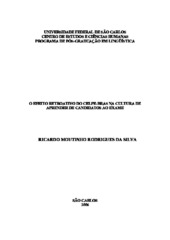O efeito retroativo do Celpe-Bras na cultura de aprender de candidatos ao exame
Abstract
The washback effect of an assessment is a redirecting element not only on teaching and learning
process, but on most student s and teacher s actions, manners, beliefs and perceptions inside and
outside the classroom, influencing the values in a society in which a certain educational system is
used. For this reason, investigating the impacts of an assessment means taking into consideration
the possible variables that go through the teaching/learning context, present in the learning
culture of an individual. The proficiency test in Portuguese Language Celpe-Bras, developed and
applied by Brazil Education Ministry, has a different proposal from the adopted one in other
proficiency tests. The Celpe-Bras, a communicative approach test, assesses proficiency through
tasks that look like real communication situations. The aim of this work is to analyze the effects
of this test in the learning culture of four applicants to the exam, showing the possible changes
observed in their beliefs, actions, manners and perceptions about the test in three different
moments: before the first contact with the exam, after the first contact with it (preparation phase)
and after its carrying out. The data of this research are constituted by thirteen interviews
conducted with selected applicants. From these interviews, twenty two excerpts were used in the
analysis. Through the results, we expect to contribute with a relevant analysis about the learning
culture of the applicants who have subscribed to this exam for the first time.
